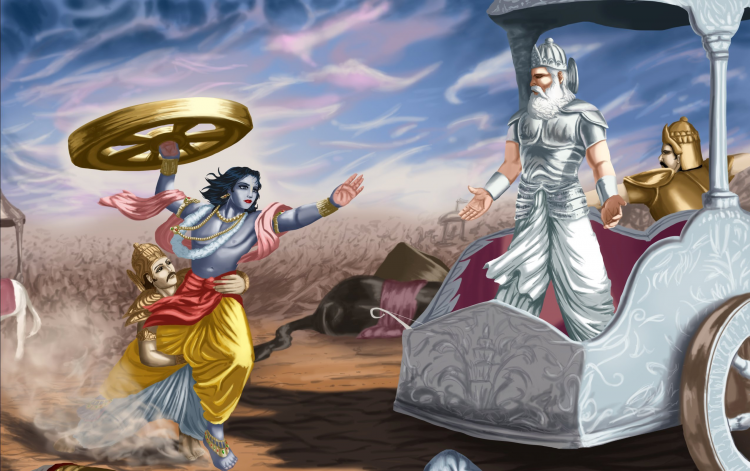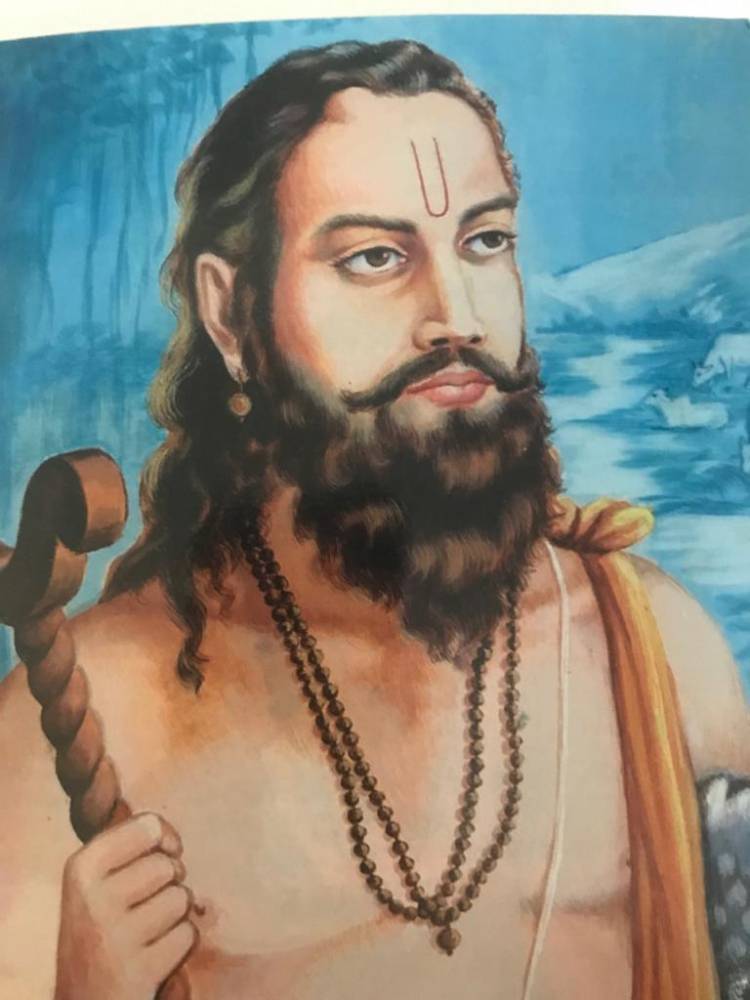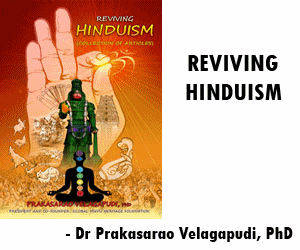Ancient Hindu Scriptures and Stress Management - part 2
NOTE: Please click on the link to read Part 1 of the Article:
https://www.savetemples.org/post/ancient-hindu-scriptures-and-business-management-part-1/606
 There are many Hindu ancient books dating back to more than five thousand years ago that have addressed issues facing at the time and disposed of them with proper knowledge and time-tested wisdom. That wisdom is as relevant today as it was eons ago. Mahabharat, Ramayana, Bhagavad Gita, Upanishads, Manusmriti, Chanakya’s Arthashastra, Samarth Ramdas, Bhishmacharya, Lord Rama and many other similar scriptures revealed the storehouse of knowledge. They contain many guidelines that can be used in business management, in the family matters, and in the circle of friends. The Companies that are concerned with material goals, financing, investments, profit making, bank balances, competition and employee morale are likely to face numerous problems with employees to motivate without proper guidance and channeling them to the higher purpose of life. The employees’ stress and constant expectations of rewards affect the morale of the company resulting in turmoil and chaos. Hindu scriptures talk about balancing the material and spiritual dimensions.
There are many Hindu ancient books dating back to more than five thousand years ago that have addressed issues facing at the time and disposed of them with proper knowledge and time-tested wisdom. That wisdom is as relevant today as it was eons ago. Mahabharat, Ramayana, Bhagavad Gita, Upanishads, Manusmriti, Chanakya’s Arthashastra, Samarth Ramdas, Bhishmacharya, Lord Rama and many other similar scriptures revealed the storehouse of knowledge. They contain many guidelines that can be used in business management, in the family matters, and in the circle of friends. The Companies that are concerned with material goals, financing, investments, profit making, bank balances, competition and employee morale are likely to face numerous problems with employees to motivate without proper guidance and channeling them to the higher purpose of life. The employees’ stress and constant expectations of rewards affect the morale of the company resulting in turmoil and chaos. Hindu scriptures talk about balancing the material and spiritual dimensions.
The CEO is the main person who can guide the organization to function smoothly and achieve the goal. For successful fruition, he must work hard coordinating various departments, supervising the teams, handling the critical issues of the day and upkeep the morale among the employees. The Atharvana Veda compared the CEO as sun. It says,
“O King! Take care of the welfare and growth of all your people
Then you will grow as the sun grows
And shines at dawn and after its rise”
Other scriptures dealt with this subject on business management that are as practical today as they were eons ago. We will examine the pertinence of some of the segments of ancient wisdom.
Bhagavad Gita
Bhagavad Gita is a universal message applicable to even modern organizations and its leaders and workforce. It can be considered as a manual that helps resolve various kinds of problems, anxieties, troubles, and stress that the human beings have to go through in day to day life. For example, Bhagavad Gita informs that the most crucial and important reason for stress is an attachment to the fruits and rewards. The more one expects, the more he is entangled in the cycle of stress, anxiety, and turmoil.
The relevance of 5000-year-old Gita is acknowledged by all the contemporary business corporations. “The Gita is old in chronologybutcontemporary in essence. When basic business principles cease to work and when the rate of change outside is faster than change within, even businesses need deeper anchor points for decision-making not available in contemporary literature,” says Debashis Chatterjee. Similarly, Vivek Bindra, corporate trainer, and director, Global ACT, says, “Gita is beyond time, place and circumstances. The temporary solutions we are seeking from the West are often inadequate. And that is turning corporates to the Gita.” Many corporations recognize Gita not as a religious book but as an integral part of the business environment. S Y Siddique of Maruti Suzuki says, “Spiritual texts often contain sound management principles that can provide vital lessons in a corporate set-up. In addition to our regular programs, we thought we could turn to the Bhagavad Gita for management insights, … I clearly believe that this has nothing to do with religion or faith per se. We all recognize that the programme is management -focused and not on religious dimensions. It is about identifying the universal principles contained in the Gita and applying them to a corporate setting.”
Nishkama Karma
Bhagavad Gita teaches us to perform one’s duty without expectations and without rewards. Bhagavad Gita advisespeople to work without attachment which is considered as an impediment to the success in doing the things either personal or professional. “While contemplating on the objects of the senses, one develops an attachment to them. Attachment leads to desire, and from desire arises anger. Anger leads to clouding of judgment, which results in bewilderment of the memory. When the memory is bewildered, the intellect gets destroyed; and when the intellect is destroyed, one is ruined.” (2:62-63). Our sense objects crave for power, money, position, excessive rewards, recognition and so on. Attachments to these objects result in anger, frustration, jealousy, greed, lust, and irritation resulting in the restlessness of mind. In general fulfillment of desires give birth to further desires. Even in Bhagavata Purana, it is recognized that “If one person were to get all the wealth, luxuries, and sensual objects in the world, that person’s desire would still not be satiated. Hence, knowing it to be the cause of misery, an intelligent person should renounce desire.” (9:19:13). Anger, obsession and excess desire cloud the intellect and flog the decision-making process. We become blind to the sense gratification.
The answer to overcoming the anger and attachment is to develop non-attachment. Nishkama karma is an action performed without any expectation of fruits, rewards or results. It is described as a duty for the sake of duty, not for any outward fulfillment of desires. As per Bhagavad Gita “you have a right to perform your prescribed duties, but you are not entitled to the fruits of your actions. Never consider yourself to be the cause of the results of your activities, nor be attached to inaction. Be steadfast in the performance of your duty, O Arjun, abandoning attachment to success and failure. Such equanimity is called Yoga, (2:47-48). By detaching oneself from the desire for fruits, nishkama karma helps to fight the stress and finds peace of mind.
If we work always with a profit motive, we get attached to insatiable desires to acquire more and more. Detachment from the fruits yields better results while attachment for rewards faces turbulence. Gita does not prohibit one from pursuing Purushardhas – dharma, artha, kama and moksha. That means one is allowed to seek money, power, fame, comforts, and other desires. Gita only requires one to pursue them without attachment.
In Bhagavad Gita, Lord Krishna expounded all kinds of managerial techniques that would lead the company to experience harmony, unity, cohesiveness, and congruence rather than experiencing tension, turmoil, conflicts, dissensions, low productivity, loss of money, high turnover and poor motivation. Management concept of vision, planning, execution, the relevance of the product, leadership qualities, teamwork, motivation, decision making, goal achievement, and profit-making are all discussed with a keen eye and sharp insight.
Leadership and Bhagavad Gita
A leader in any organization should be a role model for the rest of the members to pursue and accomplish the mission of the organization. Bhagavad Gita states: “Whatever action a great man performs, common men follow. And whatever standards he sets by exemplary acts, all the world pursues,” (3:21). A leader should practice what he does. He cannot be hypocritical. He should follow certain standards and code of conduct practiced by other great leaders.
A leader must be visionary, righteous, goal-oriented, moral, virtuous, positive and dynamic. He also should gauge the changes in the market and adjust to the circumstances. He should inspire, influence and be trustworthy. As Steve Jos once stated that “My job is to take these great people we have and push them and make them even better.” Peter Drucker acknowledges the importance of leadership when he states, “Leadership is lifting a person’s vision to higher sights, raising of a person’s performance to a higher standard, and building of a personality beyond its normal limitations.”
As per Bhagavad Gita, a leader should possess certain type of qualities that can help the leaders to propel the organizations to move in the direction that can manage and sustain for the future. The future of any organization depends on the leaders who are unique in their ability to adjust the goals to keep abreast of the changes in the market, accommodate diverse needs, and serve as a role model to be pursued by the members of the organization.
“Humbleness, sincerity, non-violence, patience, uprightness, service to guru, purity of mind and body, steadfastness, willpower, renunciation of sensory objects, devoid of egotism, understanding the inherent pains and evils of life, detachment from son, wife and home; balanced mind both in favourable and unfavourable circumstances, staunch devotion to Me, living in solitude, avoidance of social enjoyment, fixity of knowledge on the Self by ingesting it to the logical conclusion; all this is known as knowledge. Ignorance is just opposite to this.” (13:7-13).
A leader in any organization must be visionary, dynamic, virtuous, truthful, talented to pursue the dream into reality, capable of attracting good people, and muster a winning team. He should show his talents, skills and be a role model for others to emulate. He should be able to navigate the ship in the troubled waters and avoid getting it dashed. He should be inspiring and exemplary in his thinking, manners, and vision. He should be able to inspire, convince and stimulate others in the organization. Lord Krishna says, “Whatever a great person does is followed by others; people go by the example he sets up, (3:21).
Arjuna’s despondency, fear, and feeble-mindedness is a typical situation for many people in the management world. Many people try to give up the fight and decide to abandon their dreams. Lord Krishna’s inspiring, soul searching message uplifted Arjuna’s mind, stimulated his thinking, abandonedhis inertia, followed the righteous path and convinced him his dharma in taking up the challenge. Krishna’s powerful words removed the dark clouds in Arjuna’s mind. In the end, Arjuna decides to reject his dejection and concluded that, “My delusion is destroyed. I have regained my memory through your grace, O!Achuyta. I am firm, I am free from doubt. I shall act according to Your words.” (Bhagavad Gita 18:73)
CEOs who experienced the Benefits of Meditation
Yoga and meditation have helped millions of people across the globe. Patanjali Yoga Sutra has brought revolution in the way we can bring the wild animal under control. It says “yogashcitta-vrtti-nirodah.” That means yoga is the cessation of fluctuations created by the subconscious mind. Meditation helps one to focus on a given task allowing us to exclude all kinds of non-relevant thoughts, ideas, tasks, and responsibilities. Much research has been done across the globe which provides enough evidence for all of us to enjoy the fruits of meditation. Businessmen, athletes, actresses, TV personalities, coaches, and celebrities, are reaping the benefits of doing yoga and meditation. Research has shown that meditation reduces the anxiety level, stress, tension, heart diseases, while it enhances the performance levels, builds confidence level, increases concentration, enhances energy and vigor, improves general health and experience of peacefulness and calmness.
Many CEOs have stressful jobs creating physical, mental and health problems. Now there is a trend for many business people to embrace mediation to find solace for themselves and introduce meditation to their employees also. The CEO’s who practice mediation include Ray Dalio of Bridgewater Associates, Marc Benioff of Salesforce.com, Andrew Cherng of Panda Express, Bob Shapiro of Monsanto, Bill George of Medtronic, Russell Simmons of Def Jam, Oprah Winfrey, Roger Berkowitz of Legal Sea Foods, Robert Stiller of Green Mountain Coffee Roaster, Ramani Iyer of The Hartford Financial Group, Steve Rubin of United Fuels International, Nancy Slomowitz of Executive Management Associates, Marnie Abramson of Tower Companies, and Rick Goings of Tupperware.
Jeff Weiner, CEO of LinkedIn: "Part of the key to time management is carving out time to think, as opposed to constantly reacting,"
William Clay Ford Jr., Executive Chairman of Ford Motor Company: “The practice of mindfulness kept me going during the darkest days.”
Marc Benioff, Chairman, and CEO of SalesForce: “I’m trying to listen deeply, and the beginner’s mind is informing me to step back so that I can create what wants to be, not what was … I know that the future does not equal the past. I know that I have to be here at the moment.”
Arianna Huffington, Cofounder of Huffington Post and Thrive Global: “Once I’m awake, I take a minute to breathe deeply, be grateful, and set my intention for the day … Then I do 20 to 30 minutes of meditation and 30 minutes on my stationary bike, on days when I’m home. I also practice yoga most mornings.”
Oprah Winfrey, Media Proprietor, Actress, and Philanthropist: “Meditation is about getting still enough to know the difference between the voice and you. It's a heightened state of being that lets whatever you're doing be your best life, from moment to astonishing moment.”
Katy Perry, Singer and TV Personality: “I’m on a plane more than I am on ground, and this tool helps me find moments of peace — because I don’t have a whole lot of time — that extend my day so I can live my fullest capacity,” Perry said in an interview in 2016 with the David Lynch Foundation. “It gives me two days in one day!”
Sir, Paul McCartney, Singer-Songwriter: “I think it’s always very good to get a sort of still moment in your day. Whenever I have a chance in a busy schedule, I’ll do it, if I’m not rushing out the door with some crazy stuff to do.” McCartney said in an interview published in July 2014 at TMHome.com. “In moments of madness, meditation has helped me find moments of serenity — and I would like to think that it would help provide young people a quiet haven in a not-so-quiet world."
Steve Jobs, Apple Inc; “If you just sit and observe, you will see how restless your mind is. If you try to calm it, it only makes it worse, but over time it does calm, and when it does, there’s room to hear more subtle things – that’s when your intuition starts to blossom, and you start to see things more clearly and be in the present more. Your mind just slows down, and you see a tremendous expanse at the moment. You see so much more than you could see before. It’s a discipline; you have to practice it.”
Mark Bertolini, CEO, and Chairman of Aetna Insurance: By letting go to attachment, we can be present, clear-minded and live life to the fullest both at work and at play.
Madonna, Singer, and Actress: "Meditation showed me how much energy silence has,"
CEO’s comments on the usefulness of Meditation include, “ it burns off stress and gives me fresh eyes to clarify what’s really going on and what really matters”; “a TM course for your employees is probably the fastest, easiest, and least expensive way of getting more out of your workers than you could ever imagine,” "TM produced tangible, practical benefits in both their professional and personal lives," “The workplace environment soon grew from toxic to harmonious among other positive changes. And surprisingly, the company’s cost of healthcare insurance actually went down due to a reduction in sick claims.” "I have the mental clarity and alertness for both laser-like focus on the details as well as broad comprehension.” "It has demonstrably reduced my stress and helped to maintain my good health, and it has immeasurably benefited my family and business relationships. Importantly, it has helped me to make clearer, more effective decisions on the job.” "Meditation helps develop your abilities to focus better and to accomplish your tasks.'' "I meditate twice a day for 20 minutes, closing my eyes, clearing my mind, and repeating my mantra until I'm in a semi-conscious state. Sometimes, I'm wrestling with an issue before meditation, and afterward, the answer is suddenly clear.” "I enjoy meditation, which I've been doing for over a decade — probably to help relieve the stress I was going through when I was working at Oracle."
Chanakya’s Arthashastra and Business Model
 It is amazing to know that Arthashastra was written by Chanakya advising King Chandragupta Maurya as to how to rule the kingdom. What was suggested at the time is as relevant today as it was 24 centuries ago! Many of his ideas can serve as a guide for any business to establish themselves by preserving the integrity, honesty, and solidarity of the Company. He advised the King to rule the kingdom with clear vision, broad mission and proper motivation. The objectives to rule the kingdom are the acquisition of wealth, consolidation of what is acquired, expansion of the wealth and enjoyment of what is acquired. He also advised the king to avoid the six emotional evils identified as lust, anger, greed, vanity, arrogance, and overjoy.
It is amazing to know that Arthashastra was written by Chanakya advising King Chandragupta Maurya as to how to rule the kingdom. What was suggested at the time is as relevant today as it was 24 centuries ago! Many of his ideas can serve as a guide for any business to establish themselves by preserving the integrity, honesty, and solidarity of the Company. He advised the King to rule the kingdom with clear vision, broad mission and proper motivation. The objectives to rule the kingdom are the acquisition of wealth, consolidation of what is acquired, expansion of the wealth and enjoyment of what is acquired. He also advised the king to avoid the six emotional evils identified as lust, anger, greed, vanity, arrogance, and overjoy.
Chanakya observed that, “The king, the minister, the country, the fortified city, the treasury, the army, and ally are the constituent elements of the state.” A closer look at the sentence can be applied to modern business management. There are seven pillars that establish the business. The King is like a Founder or CEO who is a trailblazer with vision and a mission to achieve the envisioned goals; the minister is like the Manager of the company who is on the go to execute the plans; the country is like the market that provides the revenue for the operation of the firm; the fortified city is like head office where all major decisions are made based on the perceived demands from the market; the treasury which is the financial hub that is the heart of the financial organization; army is like your team members consisting of skilled people, salespeople and a wide variety of people with diverse talents; and the ally is like your consultants and confidants who can be counted on when the problems occur in the market.
King's happiness lies in people's happiness, the king's welfare is dependson people's welfare. Nothing is dearer to king, nothing is self of the king, whatever is dearer to people, it is dearer to king. It further says that King should not take any decision by himself, he should do it with the consultation of the council of ministers. Radhakrishnan (2005) elaborated in 12 sutras (verses) of Kautilya with regards to self-control, which includes the importance of control over the senses by giving up kama, krodha, lobha, mana, mada, and harsha, i.e. lust, anger, pride, arrogance, and foolhardiness. The first teaching of Kautilya is to conquer the internal enemies before you conquer the external ones. According to Kautilya, by casting out the group of six enemies the leader should acquire control over the senses, cultivate his intellect by association with elders, keep a watchful eye by means of spies, bring about security and well-being by activity, maintain the observance of their special duties by carrying out duties, acquire discipline by instruction in the sciences, attain popularity by association with what is of material advantage and maintain behavior by what is beneficial (Muniapan and Shaikh, 2007).
Bhishma on the Characteristics of a Minister (Manager)
 Bhishma in Mahabharata expounded a detailed and lengthy discourse of Raja Dharma (code of conduct for Kings). Lord Krishna and all the Pandavas went to see Bhishma who was laying on the bed of arrows waiting to close his eyes at the commencement of Uttarayana. After hearing the essential nature of Raja Dharma, Yudhishtira asked thus: “O Grandsire Bhishma! What are the qualities and characteristics of a Minister?”
Bhishma in Mahabharata expounded a detailed and lengthy discourse of Raja Dharma (code of conduct for Kings). Lord Krishna and all the Pandavas went to see Bhishma who was laying on the bed of arrows waiting to close his eyes at the commencement of Uttarayana. After hearing the essential nature of Raja Dharma, Yudhishtira asked thus: “O Grandsire Bhishma! What are the qualities and characteristics of a Minister?”
To be a proper King (CEO or Leader of the Organization), Bhishma says a King should possess certain characteristics: “Should be able to suppress wrath, be truthful in speech, be able to render justice, have the ability to forgive, purity of conduct, simplicity, and maintenance of dependents. These are common to all persons. In addition, as a Kshatriya to be eligible for kingship, the person should give but not beg, be able to protect people, should be able to comfort and contain the unrighteous, be proficient in battle, and be able to discipline his people to be righteous in conduct under pain of punishment in case of a breach.” These traits are very important for any CEO to be successful and they should not be overlooked.
Bhishma elucidates the characteristics as a Minister (Manager). He stresses that the Ministers and Counsellors “should be men who are modest, self-restrained, truthful and sincere. The King should select them from diverse backgrounds to have a well-balanced team. These ministers should serve as an inner cabinet. They should be wise, have friendly relations with citizens, be good administrators, possess vigor and valor, have a clean mind without any cruelty, have love and affection towards the king, and regard pleasures and sorrows equally.
A person with the above qualities alone is entitled to be a Minister. The King also shall show respect towards such Ministers.
Every businessman should learn some of these salient features to be successful in business. These characteristics are applicable to all the CEO, CCO, and anybody in any Managerial positions if they are to be successful in managing any business operations.
Rama’s Advice to Bharata
 Lord Shiva, considered as the first author of Ramayana, said that every letter ofRamayana has the power to remove even the most heinous sins. In fact, both Valmiki and Tulasidas acknowledged that it was only with the divine grace of Lord Shiva they composed Ramayana at different times. A. A. Macdonell stated, “That probably no other work of world literature has produced so profound an influence in the life and thought of people as the Ramayana.”
Lord Shiva, considered as the first author of Ramayana, said that every letter ofRamayana has the power to remove even the most heinous sins. In fact, both Valmiki and Tulasidas acknowledged that it was only with the divine grace of Lord Shiva they composed Ramayana at different times. A. A. Macdonell stated, “That probably no other work of world literature has produced so profound an influence in the life and thought of people as the Ramayana.”
Rama's leadership qualities are recognized as being a model for all kinds of people to emulate. He is credited with providing a concrete vision to his followers as in the case of searching for Sita in Lanka; believing in the ability of his subordinates to achieve the aim as in the case of Vanaras defending against Ravana’s Rakshasa army; standing courageously in the face of great adversity as in the case of fighting with Ravana; consulting his subordinates as in the case of accepting Vibhishana by allaying their fears; and following a code of ethics as in the case of allowing Ravana to return the next day as he was rendered weaponless – ethics dictate that an unarmed enemy not to be killed. He is also considered as an ideal son, an ideal brother, an ideal friend and an ideal enemy. He is always known as a man of principles, ethical, moral, and courageous leader.
What are some of the qualities one can learn and / or practice? He had a clear vision where he assembled an army of monkeys to defeat Ravana and others to rescue Sita from Lanka. The second important characteristic was his ability to organize resources effectively by training the army with the skills necessary to face the enemy. Third, he was a team player. He was able to assemble leaders such as Hanuman, Lakshman, Sugriva, Vibhishana and others who worked for his mission. The fourth trait is to have a firm belief in one’s own strength
Bharata came to know that his mother Kaikeyi was responsible for Rama’ exile to forest giving up the Kingdom. Bharata was to rule the kingdom as per his father Dasaratha’s promise to his wife Kaikeyi. Bharata goes to the forest and requested Rama to return and take the responsibility of ruling the kingdom. After refusing Bharata’s request, Rama advised him to follow the guidelines to establish Ramarajya. Lord Rama rendered a number of guidelines that would benefit not only Bharata but any personnel involved in the management of their businesses. He asked Bharata number of questions about his treatment of his parents, teachers, elders, and people to ensure domestic tranquility. Rama Counsels Bharata on a wide variety of topics such as good governance, home affairs, defense, foreign affairs, finance, and other areas. When building the bridge to cross the ocean, the rocks were sinking when placed in the water. Rama reinforced their belief by asking them to write the name of Rama on each rock that never sank again.
He was compassionate where he treated different kinds of people such as Guha, Sabari, monkey tribes and others as his own kin and kith.
Here we will select the areas that are pertinent to the management of Businesses:
Rama counsels Bharata on the comprehensive lessons on governance in question format. His questions range from quality of ministers, the importance of decision making, administration to justice, the subtleties of statecraft, the wisdom of the counselors, confidentiality, and fairness to the employees.
"I hope the ministers you have appointed are valiant like you- full of learning, who have controlled their senses, who are born of high pedigrees (cultured family) and know the meaning of signs (discreet and shrewd)."
"The sound advice given by experienced ministers well versed in the laws of truth and virtues is the very foundation on which the prosperity of a King rests."
"The learned in times of difficulty bring endless glory by solving knotty problems."
"I hope you prefer learned men to thousands of fools. No help will come to a king if he seeks advice from thousands of evil advisers or even ten thousand of them."
"Even if there is a single minister if only, he is wise, brave, clever and discreet, he will bring fame and prosperity to a King big or small."
"He who does not get rid of a physician adept in devices of aggravating a disease, a servant intent on bringing disgrace to his master and a gallant warrior seeking kingly power, is himself destroyed by these persons."
"I hope the person appointed as your Commander-in-chief is ever pleased, full of resolution, is gallant and talented, is of spotless character and well-born and devoted and clever."
"Are the foremost of your skilled warriors being recognized by bestowing suitable honors by you?" (gallantry awards).
"I hope you distribute (daily) provisions and distribute the monthly salary due to them at the proper time in a suitable manner and do not delay their payment (to prevent discontentment). For, salaried servants surely and positively get enraged even at their master when the distribution of their provisions and the disbursal of their salaries are delayed and that itself is very great harm done to the State." (Labor Relations).
"Has a man of your own State, who is learned, clever, ready-witted and capable of delivering messages correctly, who is able to distinguish between right and wrong, been appointed by you as an Ambassador, O Bharata?" (Foreign Affairs and Diplomatic assignment).
"Do you keep an eye on the eighteen functionaries of the enemies and fifteen functionaries of your side through three unknown, independent spies?"
“I hope you do not patronize Atheists Brahmins, for being ignorant and conceited since they are skilled in perverting the minds of people."
Samarth Ramdas Letter to Sambhaji
 When KingSambhaji seized power, he invited his father’s advisor, saint Ramadas to meet him. However, Ramadas displeased by Sambhaji’s brutalities that accompanied his accession refused to meet him. His disciples, however, begged him to advise the prince. Accordingly, he sent him the following letter:
When KingSambhaji seized power, he invited his father’s advisor, saint Ramadas to meet him. However, Ramadas displeased by Sambhaji’s brutalities that accompanied his accession refused to meet him. His disciples, however, begged him to advise the prince. Accordingly, he sent him the following letter:
“Always be on guard and never lower your guard. Control your temper and be good and kind towards others. Forgive your subjects for their faults and bind them to your person by making them happy. The happier they are, easier would be your task. If they are against you, your task would be hard. If you and your generals break apart your enemies will profit. Let all of you live in unity. Seek out your Mohammedan enemies and remove them from your path. Create fear in others not by your cruelty but by your valor. Otherwise, your State will be in danger. Deal with each difficulty as it arises. Keep your anger under control or at least do not betray it in the presence of others. Make your subjects your friends. Let them love rather than fear you. Make the people one; fill their minds with the single thought of resisting the Mleccha enemy. Guard what you already have, add to it by your own exertions and so extend the Maharatta kingdom. Be dignified and wear the sword of ambition. That way lies the path to success. Bear Shivaji Raje in mind. Consider yourself a mere trifle and place yourself in the quest for fame in this world and thereafter. Keep the model of Shivaji before your eyes and think of his valor and deeds. Remember always what he did in battle and how he acted towards his friends. Give up sloth and love of ease. Keep before you a certain goal and try to reach it. Never forget how Shivaji won Svarajya. If you call yourself a man, try and do better than he did.”
Business Sutras from Mahabharata and Ramayana
 DevduttPattanaik’s book “Business Sutra: A Very Indian Approach to Management”, describes the relevance of so many stories from Ramayana, Mahabharata and other scriptures to be successful in Business. He used stories, symbols, and rituals drawn from Hindu, Jain and Buddhist mythology to understand a wide variety of business situations that range from running a successful tea stall to nurturing talent in a large multinational corporation. If we believe that wealth needs to be chased, the workplace becomes a Rana-Bhoomi — a battleground of investors, regulators, employers, employees, vendors, competitors and customers; if we believe that wealth needs to be attracted, the workplace becomes a Ranga-Bhoomi — a playground where everyone is happy. Business Sutra presents a radical and nuanced approach to management, business, and leadership in a diverse, fast-changing, and increasingly polarized world.”
DevduttPattanaik’s book “Business Sutra: A Very Indian Approach to Management”, describes the relevance of so many stories from Ramayana, Mahabharata and other scriptures to be successful in Business. He used stories, symbols, and rituals drawn from Hindu, Jain and Buddhist mythology to understand a wide variety of business situations that range from running a successful tea stall to nurturing talent in a large multinational corporation. If we believe that wealth needs to be chased, the workplace becomes a Rana-Bhoomi — a battleground of investors, regulators, employers, employees, vendors, competitors and customers; if we believe that wealth needs to be attracted, the workplace becomes a Ranga-Bhoomi — a playground where everyone is happy. Business Sutra presents a radical and nuanced approach to management, business, and leadership in a diverse, fast-changing, and increasingly polarized world.”
 Many myths, stories, images and symbols that we have heard, read, and seen leave permanent imprints on our minds and impact our way of thinking and influence our decision-making process whether it is in business or in family life on our point to the way we think. Since business is about people and their needs, we have to pay attention to their thought process and their cultural background. Businesses should balance the wealth (Lakshmi), emotions and power (Durga) and knowledge and wisdom (Saraswati). Any time we concentrate only on wealth and concentrate on targets without due consideration for the emotions and knowledge; businesses will run into hardships. Hindu scriptures will provide enough resource material to dive deep into the ocean of knowledge to guide the businesses as well as private life.
Many myths, stories, images and symbols that we have heard, read, and seen leave permanent imprints on our minds and impact our way of thinking and influence our decision-making process whether it is in business or in family life on our point to the way we think. Since business is about people and their needs, we have to pay attention to their thought process and their cultural background. Businesses should balance the wealth (Lakshmi), emotions and power (Durga) and knowledge and wisdom (Saraswati). Any time we concentrate only on wealth and concentrate on targets without due consideration for the emotions and knowledge; businesses will run into hardships. Hindu scriptures will provide enough resource material to dive deep into the ocean of knowledge to guide the businesses as well as private life.
Please subscribe to Save Temples Telegram channel at https://t.me/savetemples











 Urgent support needed for Bangladesh Hindus
Urgent support needed for Bangladesh Hindus 







